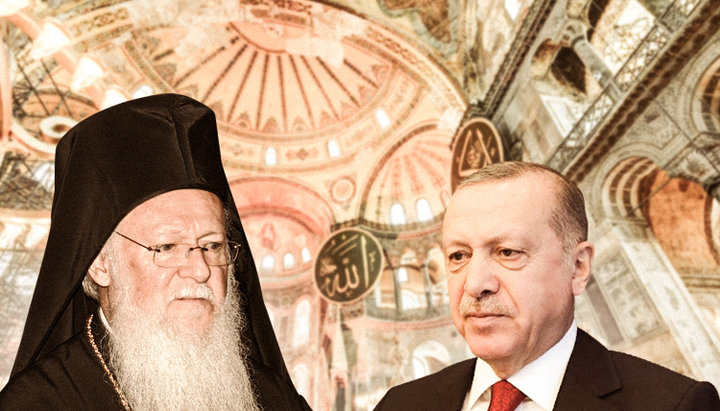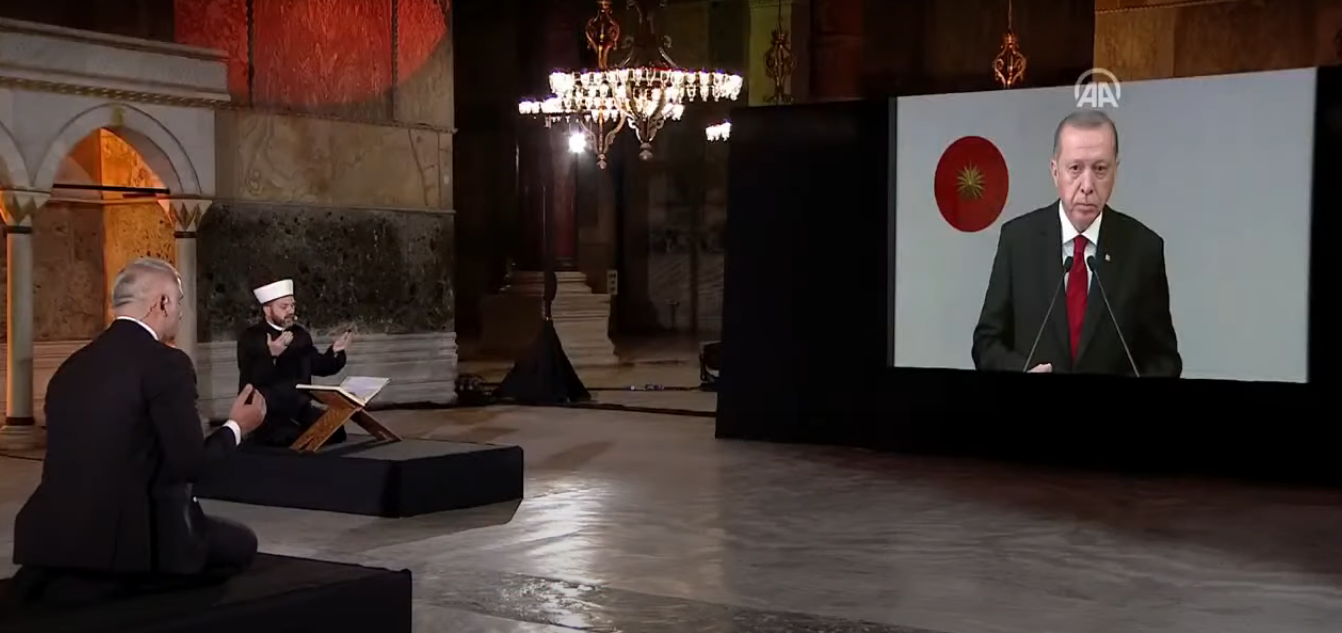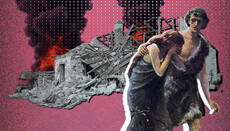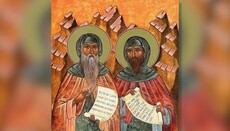Muslim prayer in Hagia Sophia: What does this mean?

What does the Muslim prayer in Hagia Sophia in R. Erdogan’s presence on the anniversary of the Fall of Constantinople mean for the Phanar and the entire Orthodoxy?
May 29, 2020. Turkey widely celebrated the 567th anniversary of the capture of Constantinople by the Ottoman Turks led by Sultan Mehmed II. The key moment of the festivities was the reading of the 48th surah of the Quran, which is called Al-Fath (Victory) in the Hagia Sophia Cathedral, once the main temple of the whole Orthodox world. The mullah again sings in Hagia Sophia, for the first time after 1934. And the Turks arrange light shows, during which they show light scenes of the capture of the once glorious city of Constantinople on the remains of the walls of this city and are proud of it.

So, the prayer that the Turks had threatened to say in the Hagia Sophia for several months, and against which the Greeks unsuccessfully protested, nevertheless, took place.
The next day, the Ministry of Foreign Affairs of Greece made an official protest about the inadmissibility of reading the surah of the Quran in Hagia Sophia. This was to be expected, but the reasoning for the protest was interesting. We quote: “Today’s reading of passages from the Quran inside Hagia Sophia, a global monument protected by UNESCO as a world heritage site that has functioned as a museum since 1935, is not only an unacceptable attempt to alter the site’s designation as monument, but also an affront to the religious sentiment of Christians throughout the world."
The reasoning for the protest is very indicative: that is, the Quran cannot be read there because it is a museum protected by UNESCO, the feelings of Christians are mentioned in the second place. The statement does not say a word that generally speaking Hagia Sophia is an Orthodox church, which was created by Orthodox believers for Orthodox worship. By the way, Patriarch Bartholomew, whom Turkish media had accused of complicity in the attempted coup d'etat of 2016 kept silent. At least the official website of the Patriarchate of Constantinople did not say anything about it.
Of course, there are Orthodox hierarchs and primates who give all their time to prayer and for whom public contact with the outside world is a heavy burden. Let's be honest – Patriarch Bartholomew feels at ease in communicating with the powers that be. Frequent contacts with US politicians (Joe Biden, Hilary Clinton, Barack Obama, and others), regular speeches at various international economic forums, etc. In a word, nothing prevented the head of the Patriarchate of Constantinople from making a strong statement against the desecration of the main shrine of his Church, calling on the entire civilized world to condemn the actions of the Turkish authorities.
Moreover, a few hours after the prayer at the opening of a hospital in Hagia Sophia, the Turkish President stated that his country has every right to turn Hagia Sophia into a mosque: "When Mohammed entered the city, he was welcomed as a saviour. It was as if they were waiting for him. Hagia Sophia, instead of being demolished due to religious hatred, became more beautiful and was offered to Muslims after the Fall. It was a right granted to them," he said.
This is a clear claim for Turkish leadership in the Muslim world, which is consistently sought by R. Erdogan. But it is also a very clear diagnosis to the Patriarchate of Constantinople, a public demonstration of the real state of affairs and the destruction of ambitions and illusions of the Phanariots and those who sympathize with them.
Judge for yourself: there are only about 700 Greeks in Istanbul today, although 20 years ago there were about 3,000 of them. A few dozen of them live in Phanar, a small quarter in Istanbul. There reside the Patriarch of Constantinople, the staff of the Patriarchate, several metropolitans, most of whom do not have any real parishes but who bear sonorous titles of the ancient Byzantine cities of Smyrna (modern Izmir), Nicaea (Iznik), etc. A few years ago, the last Greek-language newspaper "Apoevmatini" (“Evening”) was closed in Istanbul.
The service in Hagia Sophia is a very clear diagnosis to the Patriarchate of Constantinople, a public demonstration of the real state of affairs and the destruction of ambitions and illusions of the Phanariots and those who sympathize with them.
Throughout Turkey, the Patriarchate of Constantinople has no more than 10 real parishes, where divine services are held on a more or less regular basis. Nominally, there are about 80 parishes, but in most of them, services are performed approximately once a year, and this is considered a good indicator. As a rule, there are several Greeks living near such temples, who take care of them and for whose sake the Turkish authorities do not close them down.
But most of the Christian churches in Turkey are decaying buildings, in which services have not been held for a very long time, and which are becoming the prey of vandals and black archaeologists. Ancient temples are being almost openly looted.

The remaining Christians and simply indifferent local residents send letters to governments asking them to preserve these temples as a cultural heritage. But this is hardly possible as for a temple to live, prayer must be heard in it, and believers must gather there. But they do not...
In addition to the picture of the complete degradation of the Patriarchate of Constantinople in Turkey itself, it should be mentioned that there are no Orthodox schools left there. For many decades, the Patriarchate has been threatened with eviction from Istanbul to Mount Athos or another place, and the Patriarch has recently been hinted that he could be prosecuted for treason, as he was reportedly involved in the organization of the coup d'etat in 2016.
All the above may seem a kind of malevolence, they say that we are supposed to sympathize with and help the Patriarchate of Constantinople rather than be focused on its deplorable state. Indeed, it would be so if the Greeks themselves did not consider the day of the capture (fall) of Constantinople ... as their national holiday.
On May 29, simultaneously with the Muslim prayer in Hagia Sophia in Istanbul, the Greek Orthodox Archdiocese of America held an online celebration of the capture of Constantinople in 1453. Despite the complete absurdity of such an event, the American Archdiocese said: “The annual commemoration of the Fall of Constantinople is not only a remembrance of the fall of the capital of the Roman Empire on the 29th of May 1453, by the Ottomans who finally took the “Queen of Cities” established by Saint Constantine the Great some eleven centuries earlier. It is also a celebration of Byzantine culture and the Hellenic culture that sprang from this pivotal event in world history.”
To consider the destruction of the Byzantine capital as the beginning of the Byzantine and Hellenic culture is not only absurd but also an amazing level of self-awareness of modern representatives of the Patriarchate of Constantinople.
And today, these hierarchs, funded and guided by America, numerous metropolitans without dioceses and almost without parishes take the liberty to intervene in the affairs of other Local Churches. They revoke their own documents 330 years ago, they decide who to appoint “His Beatitude Metropolitan of Kiev”, and who to strip of this title, they dictate to the Ukrainian bishops (who, unlike the Constantinople manage several hundred real rather than nominal parishes with thousands of believers), which church jurisdiction to leave, and which to subordinate.
If in Turkey the Patriarchate of Constantinople has only a few hundred believers, and there are about 5 million of them abroad, then a logical question arises: why is the Patriarch not located where his flock is? For example, in Greece or the USA, where about 3 million believers of the Patriarchate of Constantinople live. Why is he clinging so persistently to his small residence in Istanbul? The answer is obvious: this allows him to position himself as the successor of the great Patriarchs of Constantinople of the past, to claim to the title "Ecumenical", to fight not just for leadership but for primacy in the Orthodox world and to present the glorious past of the Byzantine Empire, which has not existed for more than half a millennium, as the main argument in his favour.
If in Turkey the Patriarchate of Constantinople has only a few hundred believers, and there are about 5 million of them abroad, then a logical question arises: why is the Patriarch not located where his flock is? The answer is obvious: this allows him to position himself as the successor of the great Patriarchs of Constantinople of the past, to claim to the title "Ecumenical", to fight not just for leadership but for primacy in the Orthodox world and to present the glorious past of the Byzantine Empire, which has not existed for more than half a millennium, as the main argument in his favour.
Unfortunately, the Phanariots continue to live with phantom pains or dreams of the past. Although the real world is quite different, they keep trying to lead world Orthodoxy and judge all Local Churches. And this, in fact, can be called an air trade or rather history trade. Because they no longer have anything else left. All the achievements of theological thought, all the beautiful divine hymns, icon-painting, and architecture are all in the past. It is distressing that by their actions the representatives of the Patriarchate of Constantinople are causing irreparable harm to Orthodoxy. They set some Local Churches against others and provoke such extreme measures as breaking the Eucharistic communion. As a result of the activities of the Constantinople Patriarchate, the Orthodox Church does not strengthen and multiply but, on the contrary, becomes fragmented and weaker. And the Muslim prayer in the walls of Hagia Sophia is an expected result of this activity.
Almost all historians admit that the underlying cause for the fall of Constantinople in 1453 was the state of the Byzantine society itself, its vices and passions grown to catastrophic proportions.
Apparently, history repeats itself again... "Behold, your house is left unto you desolate" (Luke 13:35).











